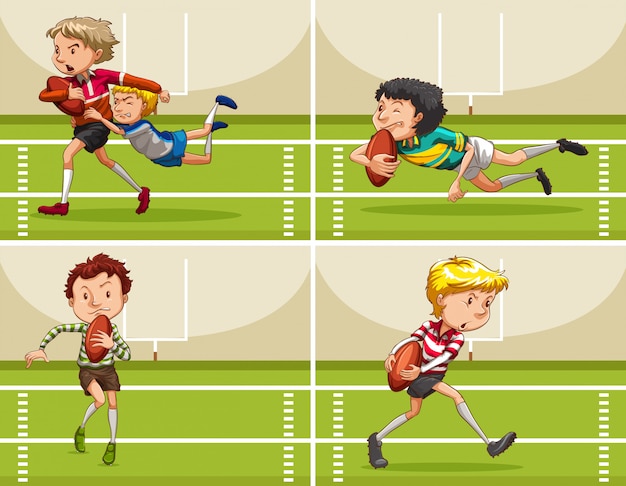Anúncios
As a parent, I often find myself searching for activities that not only keep my kids active but also instill valuable life skills. Enter flag football for kids – a sport that has been gaining remarkable popularity in recent years. It’s fascinating to see how this inclusive and non-contact version of traditional football has captivated the hearts of young athletes and their families alike.
What strikes me most about flag football is its unique blend of safety and fun. This sport allows children to enjoy the thrill of competition without the fear of serious injury, making it an excellent choice for parents concerned about their child’s safety. I can’t help but marvel at how it promotes teamwork, agility, and strategic thinking, all while my kids are simply having a blast.
Anúncios
With so many youth programs embracing flag football, common questions often arise regarding how to get started, what equipment is needed, and where to find local leagues. In this article, I will dive deep into the world of flag football for kids, unlocking the reasons behind its rising fame and the wonderful benefits it has to offer.
What is Flag Football?
Benefits of Flag Football for Kids
Participating in flag football for kids offers a myriad of physical benefits that contribute to a child’s overall health and development. The nature of the game encourages cardiovascular fitness, agility, and coordination through bursts of running, quick direction changes, and teamwork-oriented play. Children engage in regular exercise, helping to combat obesity and instilling healthy habits that can last a lifetime.
On a social level, flag football fosters important skills such as communication, cooperation, and leadership. As kids learn to work together, they develop friendships and a sense of belonging. The inclusive nature of the sport allows children of varying skill levels to participate, promoting teamwork and respect for others.
Anúncios
Emotionally, flag football provides opportunities for children to build self-esteem and resilience. Overcoming challenges on the field enhances their confidence, while learning to handle competition teaches valuable lessons about winning and losing. Through supportive coaching and camaraderie among teammates, kids cultivate a positive self-image and develop coping skills that serve them beyond the game.
How to Find Youth Flag Football Programs

When assessing a program, prioritize safety by ensuring coaches are trained in fundamental techniques and first aid. Quality coaching is essential for instilling not just skills, but also sportsmanship and teamwork values in young athletes. Inquire about coaching certifications and their experience with youth sports to make an informed choice for your child’s flag football journey.
Equipment and Gear for Flag Football
Additionally, wearing comfortable athletic clothing that allows for freedom of movement is recommended. Breathable fabrics help wick away sweat, ensuring kids stay cool during intense games. Protective gear, such as mouthguards, should never be overlooked, as they help safeguard against collisions.
Lastly, a well-sized football can make all the difference in gameplay. It’s best to choose a youth-sized ball that’s easy for smaller hands to grip during throws and catches. With the right equipment, kids can enjoy flag football while minimizing risks and maximizing fun.
Additional Resources for Flag Football Enthusiasts
To enhance the flag football experience for kids, consider exploring the following resources.
Success Stories from Flag Football Programs
Flag football programs have emerged as transformative platforms for countless young athletes, fostering personal growth and camaraderie. One standout story is that of Emma, a shy 10-year-old who joined her local flag football team. Initially hesitant, she flourished, gaining confidence and leadership skills. Emma not only improved her athletic abilities but also formed lasting friendships, showcasing how team sports can uplift and empower youth.
Another inspiring journey belongs to Malik, a boy who faced bullying at school. Enrolling in a flag football program offered him an escape and a sense of belonging. Through teamwork and shared goals, he developed resilience and a stronger self-image, proving that flag football can be a healing experience for children.
These programs are more than just games; they nurture essential life skills. Teams encourage communication, collaboration, and sportsmanship, enabling kids to thrive both on and off the field. Each success story serves as a testament to the profound impact that flag football can have on personal development and team spirit.
Inspirational Reflection
“The strength of the team is each individual member. The strength of each member is the team.” – Phil Jackson
This quote resonates deeply within the realm of youth sports, particularly flag football. It encapsulates the essence of teamwork and the vital role each player plays in both personal and collective growth. Just like Emma and Malik, every young athlete’s journey is uniquely intertwined with their team’s dynamics, highlighting that individual growth flourishes in a supportive environment. Embracing this philosophy not only enriches their sporting experience but also lays a foundation for lifelong friendships and invaluable life lessons.